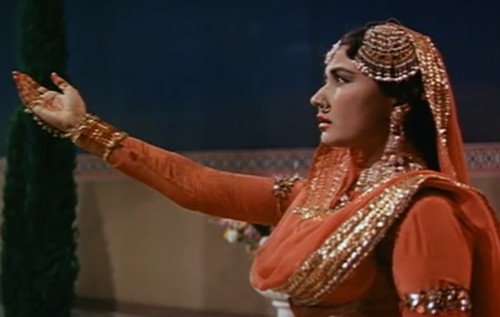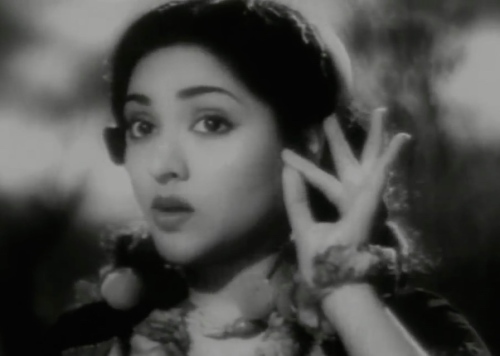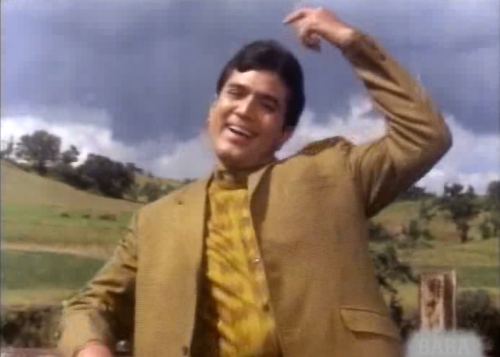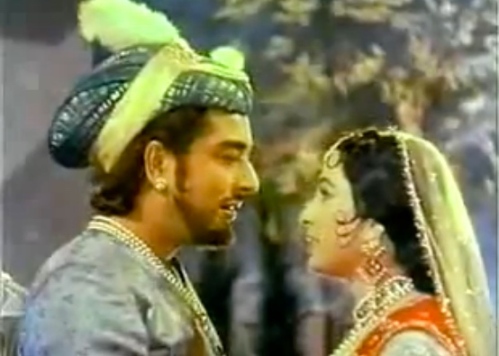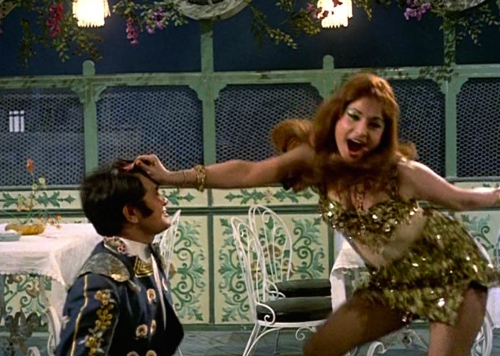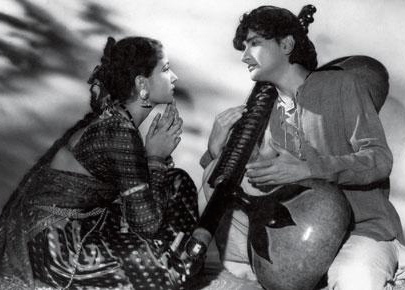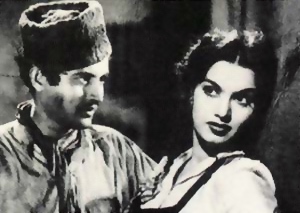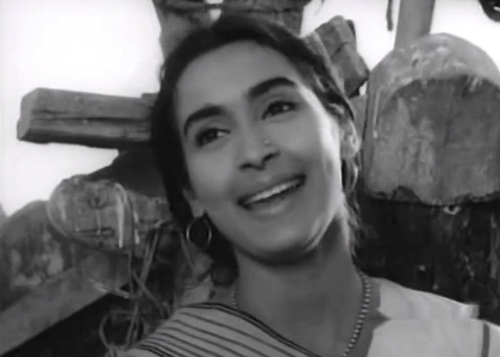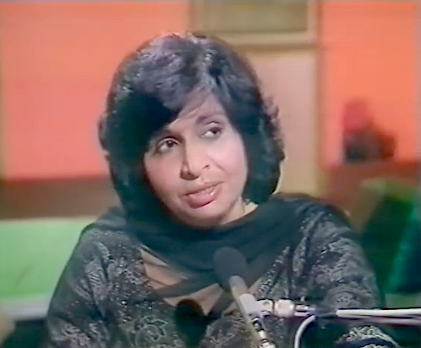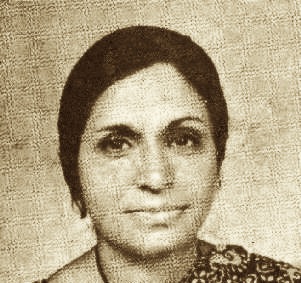The greatest music albums from classic Bollywood have been chosen. Which songs made the list of Hindi films’s top 30?
 Introduction
Introduction
Welcome to the greatest music of classic Bollywood! We at Mr. and Mrs. 55 – Classic Bollywood Revisited! have compiled our ultimate list of the top 30 best classic Bollywood film soundtracks of all-time. Music is the very soul of classic Bollywood, a legacy of beauty and style that once lit the world. These soundtracks showcase the most talented artists of Bollywood and are as diverse and transformative as the films to which they lent their magic. Long after the cinema lights fade, this music remains in the air, haunting us with desire, sustaining us through tragedy, and enchanting our daily experiences in the world.
Soundtracks of all Hindi films released between the years of 1945 to 1985 were considered and ranked based on the merit of lyrics, musical composition and complexity, historical and cultural value, vocal performance, and accomplishments of the soundtrack elements as an ensemble. Topping our list are composers Sachin Dev Burman, Rahul Dev Burman, Naushad, and the duo Shankarsingh Raghuwanshi and Jaikishan Dayabhai Panchal (often credited as Shankar-Jaikishen) whose works both defined and reinvented Bollywood. Like our enormously popular list of the Top 30 Greatest Classic Bollywood Films of All Time, these soundtracks embrace the unexpected.
The advent of music in Bollywood binds the stormy history of a shackled India emerging from depression and war with the golden age of Hollywood musical film. Many believe that films with de rigeur musical numbers is a unique hallmark of Hindi cinema. However, the early “talkie” pictures of India such as Alam Ara (1931) were heavily influenced by the popular western films like The Jazz Singer (1927) and Showboat (1929) in which the new sound technology instantly propelled musical film as the most profitable genre. Hollywood directors like Busby Berkeley whose signature spectacle was the mass ornament and nimble-footed singer-dancers like Fred Astaire and Ginger Rogers helped contribute to the hundreds and hundreds of musical films cherished by the western world during the 1930s-1950s. The then universal convention of five to seven musical numbers peppering a film was easily embraced and adapted by Hindi movie directors who introduced Hindustani musical traditions to their work. Playback singers such as Lata Mangeshkar, Mohammed Rafi, Kishore Kumar, and Asha Bhonsle were as celebrated as the actors for whom they lent their voices. Often before a film was released, a Bollywood movie’s soundtrack was played repeatedly on the radio, reaching the hearts of millions across the country who may not have afforded the luxury to see the actual film in theatres.
While Hollywood eventually diverged from the musical film genre by the late 1960s, India was awakening to its own golden era of film in which music dominated the sensory milieu. Perhaps it was the escapism of music with its perfect harmonies and piercing poetry that touched the newly freed country still finding its identity. From solemn hymns of the countryside to feverish cabarets of city nightlife, from extravagant orchestras to solitary sitar solos, and from singers whose voices seem to descend from heaven, these soundtracks unleashed new eras of possibility and romance. The music of classic Bollywood will change you forever. For a few fleeting minutes, the ideals you dreamed of are made real.
Take this journey with us through the best music albums of yesteryear Hindi cinema. This music the way is was meant to be. This is classic Bollywood.
The Top 30 Best Classic Bollywood Soundtracks of All Time:
1. Pakeezah
Ghulam Mohammed and Naushad, 1971
- Chalte Chalte – Lata Mangeshkar
- Taare Rahiyo – Lata Mangeshkar
- Teer-e Nazar – Lata Mangeshkar
- Chalo Dildar Chalo – Lata Mangeshkar and Mohammed Rafi
- Inhi Logon Ne – Lata Mangeshkar
- Mausam Hai Aashiqana – Lata Mangeshkar
- Title Music/Alap – Lata Mangeshkar
2. Guide
S.D. Burman, 1965
- Din Dhal Jaaye – Mohammed Rafi
- Aaj Phir Jeene Ki – Lata Mangeshkar
- Piya Tose – Lata Mangeshkar
- Tere Mere Sapne – Mohammed Rafi
- Gaata Rahe Mera Dil – Lata Mangeshkar and Mohammed Rafi
- Kya Se Kya Ho Gaya – Mohammed Rafi
- Saiyan Beiman – Lata Mangeshkar
3. Mughal-e-Azam
Naushad, 1960
- Teri Mehfil Mein Qismat – Lata Mangeshkar and Shamshad Begum
- Pyar Kiya To Darna Kya – Lata Mangeshkar
- Mohe Pangat Pe – Lata Mangeshkar
- Mohabbat Ki Jhooti Kahani – Lata Mangeshkar
- Aye Mohabbat Zindabad – Mohammed Rafi
- Prem Jogan Ban Ke – Ustad Bade Ghulam Ali Khan
- Yeh Dil Ki Lagi – Lata Mangeshkar
- Title Music
4. Nagin
Hemant Kumar, 1954
- Man Dole Mera – Lata Mangeshkar
- Jadugar Saiyan – Lata Mangeshkar
- Tere Dwar Khada Ek Jogi – Hemant Kumar
- Mera Dil Yeh Pukare Aaja – Lata Mangeshkar
- Sun Ri Sakhi – Lata Mangeshkar
- Yaad Rakhna Pyar Ki Nishani – Asha Bhonsle and Hemant Kumar
5. Aradhana
S.D. Burman, 1969
- Roop Tera Mastana – Kishore Kumar
- Mere Sapnon Ki Rani – Kishore Kumar
- Kora Kaagaz Tha – Lata Mangeshkar and Kishore Kumar
- Gunguna Rahe Hai Bhanware – Asha Bhonsle and Mohammed Rafi
- Baghon Mein Bahar Hai – Mohammed Rafi and Lata Mangeshkar
- Saphal Hogi Teri Aradhana – S.D. Burman
6. Teesri Manzil
R.D. Burman, 1966
- Aaja Aaja – Asha Bhonsle and Mohammed Rafi
- Deewana Mujhsa Nahin – Mohammed Rafi
- O Haseena Zulfonwali – Asha Bhonsle and Mohammed Rafi
- O Mere Sona Re – Asha Bhonsle and Mohammed Rafi
- Tumne Mujhe Dekha – Mohammed Rafi
7. Barsaat
Shankarsingh Raghuwanshi and Jaikishan Dayabhai Panchal, 1949
- Hawa Mein Udta Jaye – Lata Mangeshkar
- Chhod Gaye Balam – Lata Mangeshkar and Mukesh
- Jiya Beqarar Hai – Lata Mangeshkar
- Mujhe Kisise Pyar – Lata Mangeshkar
- Patli Kamar Hai – Lata Mangeshkar and Mukesh
8. Anarkali
C. Ramachandra, 1953
- Yeh Zindagi Usiki Hai – Lata Mangeshkar
- O Zindagi Ke Denewale – Hemant Kumar
- O Aasmanwale – Lata Mangeshkar
- Jaag Dard-e-Ishq – Lata Mangeshkar and Hemant Kumar
- Mohabbat Aisi Dhadhkan Hai – Lata Mangeshkar
- Mujhse Mat Pooch – Lata Mangeshkar
- Aaja Ab To Aaja – Lata Mangeshkar
9. Kati Patang
R.D. Burman, 1970
- Jis Gali Mein – Mukesh
- Yeh Jo Mohabbat Hai – Kishore Kumar
- Na Koi Umang Hai – Lata Mangeshkar
- Yeh Shaam Mastani – Kishore Kumar
- Pyaar Diwanaa Hota Hai – Kishore Kumar
- Aaj Na Chhodenge – Lata Mangeshkar and Kishore Kumar
10. Chori Chori
Shankarsingh Raghuwanshi and Jaikishan Dayabhai Panchal, 1956
- Panchi Banoon Udti – Lata Mangeshkar
- Aaja Sanam – Lata Mangeshkar and Manna Dey
- Jahan Main Jaati Hoon – Lata Mangeshkar and Manna Dey
- Yeh Raat Bheegi Bheegi – Lata Mangeshkar and Manna Dey
- Rasik Balma – Lata Mangeshkar
- Man Bhavan Ke Ghar – Lata Mangeshkar and Asha Bhonsle
11. Taj Mahal
Roshan, 1963
- Jo Wada Kiya Woh – Lata Mangeshkar and Mohammed Rafi
- Jo Baat Tujh Mein Hai – Mohammed Rafi
- Jurm-e Ulfat Pe – Lata Mangeshkar
- Paaon Choo Lene Do – Lata Mangeshkar and Mohammed Rafi
- Chandi Ka Badan – Asha Bhonsle and Mohammed Rafi
12. Hum Dono
Jaidev, 1961
- Abhi Na Jao Chhod Kar – Asha Bhonsle and Mohammed Rafi
- Allah Tero Naam – Lata Mangeshkar
- Kabhi Khud Pe – Mohammed Rafi
- Main Zindagi Ka Saath – Mohammed Rafi
- Prabhu Tero Naam – Lata Mangeshkar
13. Jewel Thief
S.D. Burman, 1967
- Honton Pe Aisi Baat – Lata Mangeshkar
- Aasman Ke Neeche – Lata Mangeshkar and Kishore Kumar
- Dil Pukare – Lata Mangeshkar and Mohammed Rafi
- Rulake Gaya Sapna – Lata Mangeshkar
- Yeh Dil Na Hota – Kishore Kumar
- Title Music
14. Caravan
R.D. Burman, 1971
- Piya Tu Ab To – Asha Bhonsle
- Chadti Jawani – Lata Mangeshkar and Mohammed Rafi
- Kitna Pyara Wada – Lata Mangeshkar and Mohammed Rafi
- Goriya Kahan – Asha Bhonsle and Mohammed Rafi
- Ab Jo Mile Hai – Asha Bhonsle
15. Bobby
Laxmikant Shantaram Kudalkar and Pyarelal Ramprasad Sharma, 1973
- Main Shayar To Nahin – Shailendra Singh
- Bahar Se Koi Andhar – Lata Mangeshkar and Shailendra Singh
- Jhoot Bole Kauwa Kate – Lata Mangeshkar and Shailendra Singh
- Mujhe Kuch Kehna Hai – Lata Mangeshkar and Shailendra Singh
- Na Mangoon Sona Chandi – Manna Dey and Shailendra Singh
16. Pyaasa
S.D. Burman, 1957
- Jaane Woh Kaise – Hemant Kumar
- Aaj Sajan Mohe – Geeta Dutt
- Hum Aap Ki Ankhon Mein – Geeta Dutt and Mohammed Rafi
- Jane Kya Tune Kahi – Asha Bhonsle
- Yeh Duniya Agar Mil Bhi Jaaye – Mohammed Rafi
17. Abhiman
S.D. Burman, 1973
- Tere Mere Milan – Lata Mangeshkar and Kishore Kumar
- Nadiya Kinare – Lata Mangeshkar
- Tere Bindiya Re – Lata Mangeshkar and Mohammed Rafi
- Piya Bina – Lata Mangeshkar
- Ab To Hai Tumse – Lata Mangeshkar
18. Anand
Salil Choudhury, 1971
- Zindagi Kaisi Hai Paheli – Manna Dey
- Kahin Door Jab Din – Mukesh
- Maine Tere Liye Hi – Mukesh
- Na Jiya Lage Na – Lata Mangeshkar
19. Kabhi Kabhi
Mohammed Zayur Khayyam, 1976
- Kabhi Kabhi Mere Dil Mein – Lata Mangeshkar and Mukesh
- Pyar Kar Liya To – Kishore Kumar
- Main Pal Do Pal Ka – Mukesh
- Mere Ghar Aayi Ek – Lata Mangeshkar
- Tere Chehre Se – Lata Mangeshkar and Kishore Kumar
20. Baiju Bawra
Naushad, 1952
- O Duniya Ke Rakhwale – Mohammed Rafi
- Man Tarpat Hari Dar – Mohammed Rafi
- Mohe Bhool Gaye Sanwariya – Lata Mangeshkar
- Jhoole Mein Pawan Ke – Lata Mangeshkar and Mohammed Rafi
- Tu Ganga Ki Mauj – Lata Mangeshkar and Mohammed Rafi
21. Mother India
Naushad, 1957
- Duniya Mein Hum Aaye Hain – Lata Mangeshkar, Usha Mangeshkar, and Meena Mangeshkar
- Ghunghat Nahin Kholungi – Lata Mangeshkar
- Nagari Nagari Dware Dware – Lata Mangeshkar
- O Janewalo Jao Na – Lata Mangeshkar
- O Gadiwale – Shamshad Begum and Mohammed Rafi
22. Madhumati
Salil Choudhury, 1958
- Aaja Re Pardesi – Lata Mangeshkar
- Dil Tadap Tadap – Lata Mangeshkar and Mukesh
- Suhana Safar – Mukesh
- Ghadi Ghadi Mora Dil – Lata Mangeshkar
- Chadh Gayo Papi Bichua – Lata Mangeshkar and Manna Dey
23. Basant Bahar
Shankarsingh Raghuwanshi and Jaikishan Dayabhai Panchal, 1956
- Duniya Na Bhaye Mohammed Rafi
- Bhaye Bhanjana – Manna Dey
- Ja Ja Re Ja – Lata Mangeshkar
- Main Piya Teri – Lata Mangeshkar
- Nain Mile Chain Kahan – Lata Mangeshkar and Manna Dey
24. Aar Paar
O.P. Nayyar, 1954
- Babuji Dheere Chalna – Geeta Dutt
- Sun Sun Sun Zalima – Geeta Dutt and Mohammed Rafi
- Kabhi Aar Kabhi Par – Shamshad Begum
- Yeh Lo Main Haari Piya – Geeta Dutt
- Hoon Abhi Main Jawan – Geeta Dutt
25. Kashmir Ki Kali
O.P. Nayyar, 1964
- Deewana Hua Badal – Asha Bhonsle and Mohammed Rafi
- Isharon Isharon – Asha Bhonsle and Mohammed Rafi
- Subhan Allah Haseen – Mohammed Rafi
- Kisi Na Kisi Se – Mohammed Rafi
- Meri Jaan Balle Balle – Asha Bhonsle and Mohammed Rafi
26. Bandini
S.D. Burman, 1963
- Ab Ke Baras Bhej – Asha Bhonsle
- O Re Mahji – S.D. Burman
- Mora Gora Ang Laile – Lata Mangeshkar
- Jogi Jab Se Tu Aaya – Lata Mangeshkar
- O Janewale Ho Sake – Mukesh
27. Sangam
Shankarsingh Raghuwanshi and Jaikishan Dayabhai Panchal, 1964
- Yeh Mera Prem Patra – Mohammed Rafi
- Bol Radha Bol – Mukesh
- Dost Dost Na Raha – Mukesh
- O Mehbooba – Mukesh
- Har Dil Jo Pyar Karega – Lata Mangeshkar
28. Yaadon Ki Baraat
R.D. Burman, 1973
- Chura Liya Hai – Asha Bhonsle and Mohammed Rafi
- Aapke Kamre Mein – Asha Bhonsle and Kishore Kumar
- Lekar Hum Deewana Dil – Asha Bhonsle and Kishore Kumar
- Meri Soni Meri Tamana – Asha Bhonsle and Kishore Kumar
- Yaadon Ki Baraat – Mohammed Rafi and Kishore Kumar
29. Amar Prem

R.D. Burman, 1972
- Chingari Koi Bhadke – Kishore Kumar
- Raina Beeti Jaaye – Lata Mangeshkar
- Kuch To Log Kahenge – Kishore Kumar
- Yeh Kya Hua – Kishore Kumar
- Bada Natkhat Hai Yeh – Lata Mangeshkar
30. Umrao Jaan
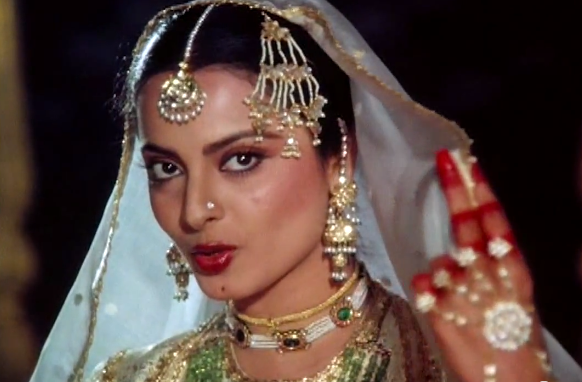
Mohammed Zayur Khayyam, 1981
- In Ankhon Ki Masti – Asha Bhonsle
- Dil Cheez Kya Hai – Asha Bhonsle
- Justuju Jiski Hai – Asha Bhonsle
- Yeh Kya Jagah Hai – Asha Bhonsle
- Jab Bhi Milti Hai – Asha Bhonsle
Find out more about these and other classic Bollywood soundtracks on our song pages! Which soundtracks do you consider among classic Bollywood’s all-time best and why? Leave us a comment and let us know!
– Mrs. 55

